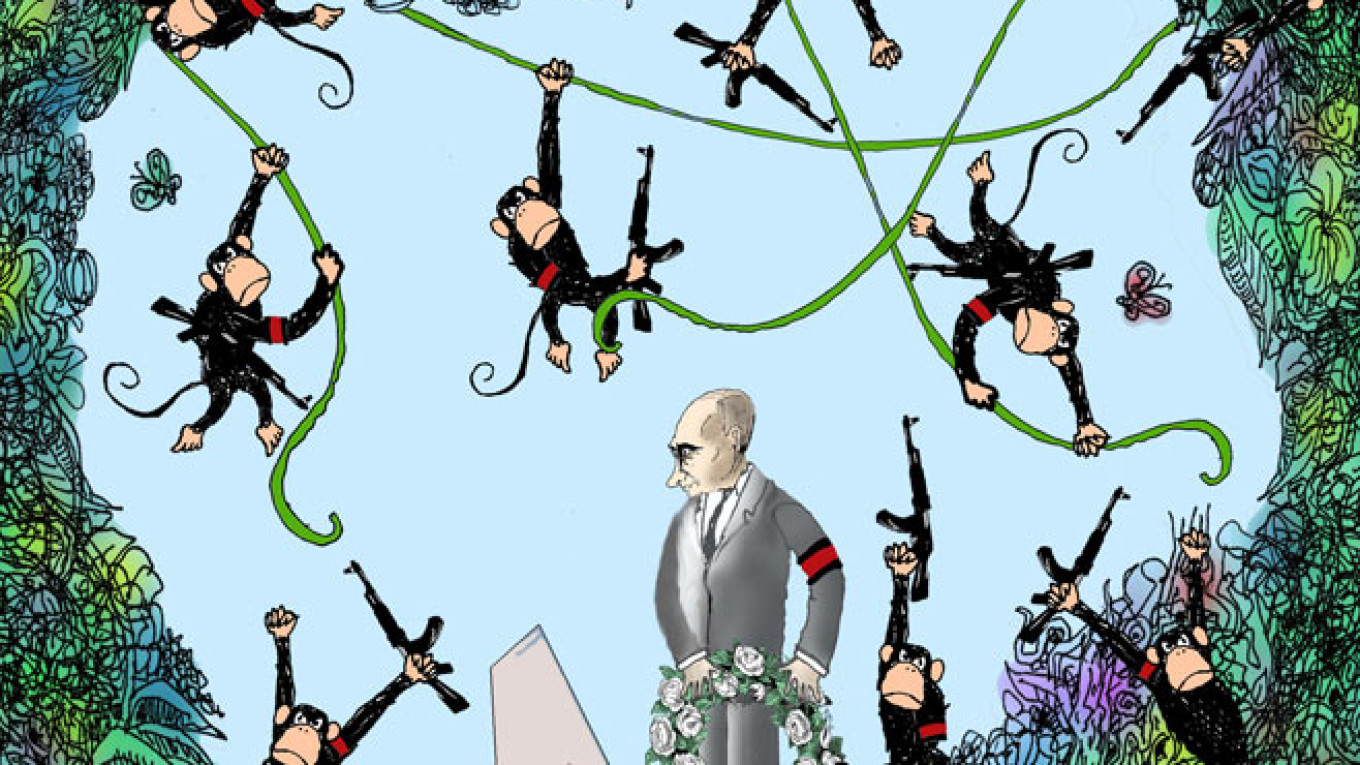In a twist of morbid irony, the village of Hrabove, or Grabovo, in eastern Ukraine, is only one letter away from having the word "coffin" in its name — grob in Russian. Today it is the scene of devastation and loss not seen in Europe since the Lockerbie disaster.
Debris from Malaysia Airlines Flight MH17 is scattered over the rolling fields. Shocked residents describe bodies falling from the sky, a woman's shed roof perforated by one of the victims. Two days after the crash, his body had still not been removed.
Predictably, the Russian and Ukrainian governments both point the finger toward the other in assigning responsibility for bringing down the civilian aircraft. There are widely circulated rumors, apparently spread by the Russian Federal Aviation Agency, that President Vladimir Putin's flight from Latin America was the original target. There are outright bonkers conspiracies on the Russian Internet involving the missing Malaysia Airlines Flight 370, U.S. special forces, fake passports and the "strange" Facebook profiles of victims.
And the most credible version of them all: that the tragedy was a result of a mistake by the pro-Russian rebels in eastern Ukraine who thought they had brought down a Ukrainian military plane and bragged about it on the Internet with the phrase, "We told them not to fly over our skies." But this is not about who operated the Buk missile launcher that likely caused the disaster.
This is about the cynicism, the disregard for human life and suffering that has been the staple approach of President Vladimir Putin since his ascent to power.
It is difficult to forget the tension and horror that the people of Russia — or at least the people of Russia that I know — felt as we watched the Kremlin abandon the 118 crew members of the nuclear submarine Kursk, the sailors left to suffocate at the bottom of the Barents Sea.
It took Putin five days to interrupt his summer vacation, as the country held its breath in hope that the sailors who were still alive might be rescued. His impossible-to-forget response to Larry King's question of what happened to the submarine was a smirking, "It sank."
Putin's jailhouse slang in reference to Chechen fighters, whom he famously ordered "wasted in the outhouse," is one thing, but the senseless waste of life during the siege of the school in Beslan, or the taking of the Dubrovka theater in Moscow during a counter-terrorist operation that killed more than 300, nearly 200 of them children, and more than 130 hostages respectively is something entirely different.
Stalin famously quipped that one death is a tragedy, a million a statistic. As Russia goes from tragedy to tragedy, from terrorist attacks on the Moscow metro and Domodedovo Airport to 20 lives lost in the recent Moscow subway derailment, Putin's unflinching, Botox-paralyzed face sidesteps blame without a trace of empathy, his drooping, cold eyes seemingly unaware of his role, and the role of his policies, in the tragedy at hand.
What is different about the crash in Ukraine is that the whole world is watching. It watches as Russia's president lays blame on the "country of origin," as if it were not widely known that the use of Russian military equipment by the rebels, who have shot down numerous planes and helicopters since the start of the conflict, is not a major factor in this tragedy.
As if the Kremlin's underhand support for the separatists, as it calls them, is not fueling the devastating conflict that has so far claimed more than 1,000 lives. As if the same rebels who wreaked havoc on the crash site, with OSCE investigators guarded by drunk men firing their Kalashnikovs in the air, are not a Frankenstein-like product of his, to borrow from German Chancellor Angela Merkel, disengagement from reality.
What is at stake today, as the squabble over body parts and black boxes continues, with some reports of marauding and further unthinkable trespasses, is the price of human dignity.
Commentators have called this Putin's Lockerbie and equated it to the 1983 downing of the Korean "spy plane" that further weakened the U.S.S.R.'s already frail international position.
As Muscovites lay flowers in front of the Dutch Embassy with notes spelling out, "Forgive us," the honorable, humane thing to do would be for Putin to take a firm stand on the issue and demand full access and total transparency from the rebels. He might just be the only one capable of wielding any influence over them, even though the chaotic nature of the conflict seems to have snowballed past even his powers of persuasion.
Yet somehow, looking back at his track record in dealing with human suffering, his terse moment of silence at the news conference might be the best the 298 victims of Flight MH17 will get.
Anna Pivovarchuk is the deputy managing editor and culture editor of Fair Observer.


